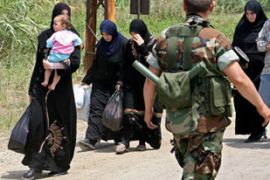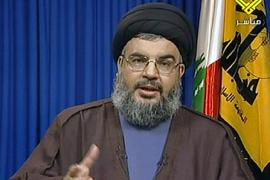Standoff continues in Lebanon
Hezbollah leader warns that military aid will drag Lebanon into “America’s war”.

Published On 26 May 2007
Fighted resumed late on Saturday night as the Lebanese army and fighters inside the camp exchanged fire, Al Jazeera’s correspondent Zeina Khodr said.
On Friday, Hassan Nasrallah said in a televised speech that the country risked getting dragged into America’s war against al-Qaeda.
“The problem in the north can be solved politically and through the judiciary,” he said.
| Exile in Lebanon | ||
Al Jazeera’s Mike Hanna talks to Palestinian refugees about their relationship with Lebanon |
The Lebanese army has besieged Fatah al-Islam, an al-Qaeda linked group made up of fighters from across the region, since Saturday.
Nasrallah said the situation could still be solved “in a way that protects the Lebanese army, our Palestinian brothers, the state and peace and stability without transforming Lebanon into a battleground”.
He said accepting US help would draw more fighters into the country and potentially destabilise it.
Fouad Siniora, Lebanon’s prime minister, has defended the import of military supplies from the US, saying the supplies had been offered by several countries months ago.
“Political negotiations”
 |
| Nasrallah said the situation could still find a political solution [AFP] |
The US-supplied aid is a sensitive issue in Lebanon, where opposition leaders accuses the government of working to Washington’s agenda.
Palestinian factions have been seeking a negotiated solution to end the siege and avert a battle between the Lebanese army and Fatah al-Islam as thousands of civilians who remain in the Nahr al-Bared camp risk being in the line of fire.
Osama Hamdan, Hamas’ representative in Lebanon, said that “as long as we agree on the necessity of a solution and we speak with a language of solution, then there is optimism”.
Elias Murr, Lebanon’s defence minister, said on Friday he was “leaving room for political negotiations”, which he said must lead to the surrender of the fighters from Fatah al-Islam.
“If the political negotiations fail, I leave it to the military command to do what is necessary,” he told reporters.
Civilians flee camp
On Saturday, more civilians, mostly women and children, were reported to have fled from the refugee camp as the army’s siege of the area continued.
| Your Views |
|
“From outside Lebanon it’s very easy to condemn the Lebanese army and government for what they are doing against Fatah-al-Islam” Rabih, Mansourieh El Metn, Lebanon |
Meanwhile, the UN has called for the protection of thousands of civilians trapped by the Lebanese army’s siege of the camp.
“An estimated 10,000 civilians remain in the embattled camp with only sporadic humanitarian support during very brief ceasefire periods,” said Unicef, the UN children’s agency.
“Children living in Nahr al-Bared have been through unspeakable trauma,” it added.
“Already living in a refugee situation, they have witnessed their homes being destroyed, loved ones being killed or injured, and were trapped in their homes hearing the terrifying sounds of gunfire around them.”
Fighting between the Lebanese military and Fatah al-Islam has left scores dead, destroyed houses and triggered a flood of refugees from the camp, which had a population before the fighting of more than 31,000, according to UN figures.
About half of Nahr el-Bared’s population fled the camp during the truce, flooding into the nearby Badawi camp.
At least 20 civilians and 30 soldiers were killed in the fighting earlier this week.
The Lebanese military says 60 Fatah al-Islam fighters were killed, though the group put the toll at 10.
Source: News Agencies
